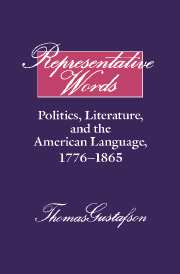Book contents
- Frontmatter
- Contents
- Acknowledgment
- Abbreviations and Editions Cited
- Introduction
- Part I The American Logocracy: The Nexus of Word and Act
- Part II Political and Linguistic Corruption: The Ideological Inheritance
- 3 The Classical Pattern: From the Order of Orpheus to the Chaos of the Thucydidean Momen
- 4 The Christian Typology: From Eden to Babel to Pentecost
- 5 Eloquence, Liberty, and Power: Civic Humanism and the Counter-Renaissance
- 6 The Enlightenment Project: Language Reform and Political Order
- Part III The American Language of Revolution and Constitutional Change
- Part IV From Logomachy to Civil War: The Politics of Language in Post-Revolutionary America
- Afterword
- Notes
- Index
- Cambridge Studies in American Literature and Culture
5 - Eloquence, Liberty, and Power: Civic Humanism and the Counter-Renaissance
Published online by Cambridge University Press: 05 January 2012
- Frontmatter
- Contents
- Acknowledgment
- Abbreviations and Editions Cited
- Introduction
- Part I The American Logocracy: The Nexus of Word and Act
- Part II Political and Linguistic Corruption: The Ideological Inheritance
- 3 The Classical Pattern: From the Order of Orpheus to the Chaos of the Thucydidean Momen
- 4 The Christian Typology: From Eden to Babel to Pentecost
- 5 Eloquence, Liberty, and Power: Civic Humanism and the Counter-Renaissance
- 6 The Enlightenment Project: Language Reform and Political Order
- Part III The American Language of Revolution and Constitutional Change
- Part IV From Logomachy to Civil War: The Politics of Language in Post-Revolutionary America
- Afterword
- Notes
- Index
- Cambridge Studies in American Literature and Culture
Summary
Potentissima belli; pacisque machina; Oratio. Eloquence, the mightiest Engin [both of war and peace] in the world.
Gabriel Harvey, MarginaliaThe ferment and germination even of the United States to-day, dating back to, and in my opinion mainly founded on, the Elizabethan age in English history, the age of Francis Bacon and Shakespere.
Walt Whitman, “A Backward Glance o'er Travel'd Roads”At the end of the Middle Ages in Italy, Dante contemplated in De Vulgari Eloquentia a people divided among themselves by their diverse tongues – a consequence, in his mind, of man's disobedience in building the tower of Babel. Italy alone, he noted, had “at least fourteen vernaculars, all of which have variations within themselves,” and it was his quest to establish “one illustrious vernacular” in his country that had been divided by dialects, by rival city-states, and by factions within city-states such as the one in Florence that drove him into exile. Dante chose to write The Divine Comedy in the vernacular, the language of temporality, change, history – of fallen man. He chose to write On Monarchy in Latin, the sacred language that united citizens of the City of God. Not long after Dante's death, at the advent of the renaissance des lettres, Petrarch, who did much to inaugurate that movement, composed letters to his favorite classical authors and dreamed of recovering their eloquence, just as he dreamed that Italy could be restored to the glory and grandeur of ancient Rome.
- Type
- Chapter
- Information
- Representative WordsPolitics, Literature, and the American Language, 1776–1865, pp. 117 - 136Publisher: Cambridge University PressPrint publication year: 1993



